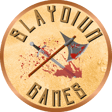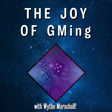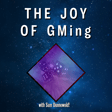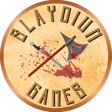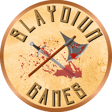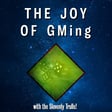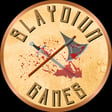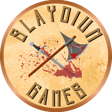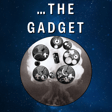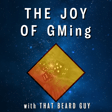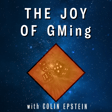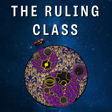Become a Creator today!Start creating today - Share your story with the world!
Start for free
00:00:00
00:00:01

The Joy of GMing - with Special Guest Jacob Cordas
Welcome to the sister-series to Anywhere But Now— our Doctor Who Actual Play Podcast! Our special guest today is Jacob Cordas, one of the top rated, top reviewed, most played GMs on StartPlaying! He's a former Escape Room designer, with hundreds and hundreds of games' worth of experience!
Eps will be released between Mods or episodes with our ongoing, serialized show. We’ll cover some making-of and behind the scenes tidbits of our latest mod as well, so do stick around, with host Casey Jones!
Be sure to subscribe and leave a comment, and follow us on Twitter for more updates. Come say hi! If you enjoy the ep, share it with your friends! If you don't, share it with your enemies!
Music by Tabletop AudioTheme by RJ Pirchinello
Transcript
What draws us to adventure stories?
00:00:13
Speaker
Yeah.
Special interview series: Craft of gaming
00:00:35
Speaker
Whether you're at a game table, in your comfiest chair reading a book, or listening at home, there's nothing like a great adventure story. But they don't happen by accident. Welcome to the joy of GMing, a special interview series on the craft of great gaming. There's just something magic about sitting down to a good table with great friends, isn't there?
00:00:57
Speaker
If you're a lifelong gamer or a newbie rolling up your first character sheet, if you're a DM or a GM, or you just can't get enough tabletop talk in your day, this is the show for you. Each episode will bring you amazing guest speakers to talk about writing games and running them, building fantastic worlds and compelling story arcs, and oh, so useful tricks of the trade.
Guest Introduction: Casey Jones and Jacob Cordes
00:01:20
Speaker
Here's some amazing conversations, get inspired for your next game, and join us for an hour or so of lively conversation.
00:01:28
Speaker
I'm Casey Jones, writer and voice actor. Over the last dozen years, I've written and produced screenplays, children's animation for TV and film, graphic novels, stage plays, murder mysteries, and audio adventures. I've also been writing and running tabletop games for over 10 years. Join me as we dive deep into creativity with fellow experts in making stuff up.
00:01:52
Speaker
This sister series to Anywhere But Now, our Doctor Who actual play podcast, will be released between mods or episodes with our ongoing serialized show. We'll cover some making of and behind the scenes tidbits of our latest mod as well, so do stick around. And now, introducing our special guest today, Jacob Cordes. Hi there, happy to be here.
How does Jacob Cordes approach game mastering?
00:02:12
Speaker
Hi, Jacob.
00:02:13
Speaker
Jacob Cordes has been professionally doing theater work since they were 18 when they staged their first play. They continued to do so, filming their first feature-length film a few years later, having performed comedy odd and off for over a decade, and even having designed professionally for Illusions' escape rooms. They are also currently one of the top-reviewed, top-recommended, and top-played GMs on Start Playing, a semi-regular guest and writer for Cheesy Gordita Bunch, and will be appearing on a miniseries for the fantastic show
00:02:42
Speaker
Moon Harbor Heroes. Hello Jacob. Yeah, hello. I'm excited to be here. I'm excited that you're here. We're happy to have you. So I would love to just dive in and talk about your background in theater and improv because I have those same roots under the soil and I would love to hear you tell us about Zero Prep and how that shapes your approach to building a game.
00:03:07
Speaker
Oh, yeah. Yeah, I'm 100% zero prep GM as much as possible. I've been doing theater stuff, which I'm sure helps inform makes this possible since I was seven or eight and then just kept going from there. I remember as a kid having to choose between either doing sports or doing theater and I without pause did theater. That's great.
00:03:29
Speaker
There was a traveling children's theater that in a week we would stage a musical together. So we did jungle books and from that point on I've never really looked back. I did a couple of classes when I was a teenager with Second City. I did theater the whole time. When I was 18 instead of going to college I got my first play stage as part of a festival in New York.
00:03:53
Speaker
Yeah, I was very lucky. That being said, I was way too young and way too depressed to try to do that. That was a horrible mistake. An 18 year old should not be responsible for all of that.
00:04:07
Speaker
I don't think a 26 year old should be responsible for all of that. That's when I know I have, you know how when it gets late at night and you'll have that anxiety thought come tumbling through your head. One of my frequent anxiety thoughts is the fact that I put in the description of the play I staged at 18. I referred to myself as a wonderkin and that will haunt me till I die. That is a choice that I will never be able to walk back.
00:04:32
Speaker
But as long as you learn from it and don't actually refer to yourself in such flattering terms and let other people refer to you in those flattering terms Oh, yeah. Yeah, if you want to call me a wonder kind I'm not stopping you. In fact, I would love it. But I'm a no
00:04:48
Speaker
And I just kept doing it since then.
What shaped Jacob's transition to tabletop games?
00:04:50
Speaker
I did stand up for, I think, around five, six years, somewhere in that range. I was terrible at it, but I still did it for far too long. And I was doing stand up about the same time. I didn't start DMing until I was, or even playing any tabletop games. So I was 18 or so. That's when I started doing this kind of thing. And within two months of me trying the games, I was like, oh, I'm going to run this.
00:05:12
Speaker
And I actually, the first game I ever ran was a Doctor Who game that I overwrote to hell. Oh no. And an hour into the game, my players went, hey, hey, hey, hey, this isn't fun. We're happy to try again sometime, but we are not going to finish.
00:05:30
Speaker
Yeah, that kind of set, it became a malicious, I'm going to defeat you, I will be amazing at this, you can't stop me. It was more spiteful, like you say I'm bad at this? How dare you? And to be fair, I was horrible. I feel like a lot of modern GMs, people who've just started in the last couple of years, don't remember that until like five years ago, there wasn't a community where you could just listen to a bunch of people play games to learn how to play a game.
00:05:59
Speaker
You learned how to play by playing with your friends, failing and trying again, trying again, trying again. Trial and error is a fantastic teacher, especially for GMing. Oh, yeah. I have committed my own sins as a GM, even with the game I love the most, which is Doctor Who. Same. After one session in the long ago, at least I can say that much, but one early session,
00:06:24
Speaker
After the game was over, one of the players said, I think I'm done. I don't need to attend more exposition. Yeah, that was the exact issue I made with Doctor Who, was I made it like too much of them sitting in vehicles and hearing about things. Which is what the show is, but also isn't fun to play. No. Yeah, it was rough. But I dedicated literal years and slowly became the default GM for the group.
00:06:50
Speaker
And just kind of from that point on it was unless somebody really wanted to run something I was the person that everybody went to to run their game. Well, that had to feel good. Yeah. Yeah, it was a nice it was a nice retribution. It was very nice being vindicated. Eventually, I eventually I went back and actually ran the Doctor Who game with them. And it was up to that point probably the best thing I'd ever run. Oh, nice. And one of the players who played in the first session played in that
00:07:18
Speaker
And there was a part of me that had to restrain himself, just being like, haha, I told you I could do it. Don't take this from me. You had fun with the secret of the sentient grass? It was me the entire time, you foolish fools. Yes, I planned this. That's great. But yeah, I became a no prep GM. I actually know the exact session that turned me into a no prep GMer set me down this road. I was running a game called News and Masterminds 2E.
00:07:47
Speaker
which is a game that I deeply, deeply love. Very, very crunchy, takes a lot of time to like set up. Great superhero game. If you want like that made by the guy who I believe went on to make icons, which is the slightly the much more accessible version. Nice.
00:08:04
Speaker
I was playing the Mutants of Masterminds 2E and I had planned this massive venture session where there was going to be a train with a card on it and there were super villains that they had to fight and then the train would actually go underwater and then it took place in the DC universe because I'm just every kind of nerd who can be stacked up each other. Naturally.
00:08:23
Speaker
So it would go underwater and there'd be eels and sharks that had Bane's venom put inside of them. And then it would be this huge big thing. And then the player, one of the players figured out a way to just sneak up to the box and was like, oh, you're going to be trapped. Oh, you think I'm not ready for this? They walked up to it and then effectively put it into a pocket dimension. And that was what I had just spent 12 hours prepping. My jaw is silently on the floor.
00:08:51
Speaker
I have never been angrier at a bunch of people as that happened and I was just like, oh, okay, the devil shows up. I guess that's what's happening. Cause I just, I had to place my anger somewhere and I needed an NPC to do it. But it was one of those things where I was like, well, I can't, I can't let this happen again. Like I can't prep all this stuff.
00:09:08
Speaker
and then immediately have 90% of it thrown out the window and have these like cool diagrams like I could try to redo or rework a little bit to make it sort of work. But the choices they made in that session are way more exciting than the choices I had any of the choice I conceived of.
00:09:25
Speaker
And I slowly, as a GM especially, stopped viewing what I was doing as like telling, I a lot of times think of it as like me building stories or crafting like a narrative or something like that. It is me crafting problems for players to solve. It is me putting together a problem, a situation in which drama will unfold from it.
00:09:51
Speaker
I am only ever building the inciting incident and then responding to whatever choices they make. How do you approach that with zero prep though? So what I'll normally do is like the extent of my prep at this point, I will write a thing for the page on Start Clang that's just like, this is the pitch of the game. And then I will forget what that pitch is and reread it at the start of the first session. Oh, fun.
00:10:17
Speaker
And then it's like, oh, cool, that was a good idea. Jacob of three weeks ago had a really solid idea there. Yeah, I can work with that. And I have games that multiple games that I have done like that that are that are into almost the two year mark at this point, maybe pass a two year mark. And it's been effectively zero prep continuous storytelling the whole way through. Oh, wow.
Why is session zero crucial in gaming?
00:10:36
Speaker
Occasionally I'll jump in if it's like a really big dramatic moment and I know the players are looking for a certain beat to happen or something like that or I'll like pre-prep like oh I know this person's gonna be dealing has this relationship with this god so they need to have this you know they need like a calamitous form to take over because in case they fail these saves I don't make it really fun you know
00:10:56
Speaker
But even then, half the time, I will make the stat blocks up on the fly. There's a couple of websites I use that let me do it pretty quickly, and I'm pretty efficient at using them. Wonderful. Yeah, I try to do everything as much as I can. I want it to as much be in the moment as possible.
00:11:12
Speaker
No, absolutely. And I'm picking up on that, that spontaneity, which is just bread and butter of improv. Can you talk us through like a session one, not a session zero, but like a game that you have completely forgotten about and you've got players that show up and say, we want to do this cool thing and you've done no prep. How does session one go in that environment?
00:11:37
Speaker
Yeah, so normally, I do have to hit a little bit on the session zero, if only because it informs the start of a session because like my session zeros are generally like two and a half hours, two hours from half hours. And the last little bit of my session zeros are me going through is like, how do you all know each other? What brings you to where you are?
00:11:57
Speaker
What is the group motivators, right? And then generally that informs what the session zero will be. Especially if it's D&D, especially.
00:12:10
Speaker
I'm normally doing, you know, it's going to, it's probably going to be a like introductory to the world and abductory combat kind of session is almost always what a session one is. Just, I feel like that's what it is regardless as you're prepping or not. It's just, you need to give the team a chance to work together to see how they, how all their abilities pan out. Um, and trying to find a fun, dynamic way to do that. I, I did it recently. I just started a astral to give a good example. I just started a, um,
00:12:37
Speaker
Oh God, it's Spelljammers. I just started the Spelljammers campaign and the players, like at the very, I, all the players have specified they wanted a chaotic game. They wanted it to be very piratey. They wanted it to be very, you know, things are, things are going wild. So, you know, it starts with them being chased and hunted and hiding in an asteroid belt immediately. Like we start in this media res, very dramatic moment.
00:13:03
Speaker
And then yeah and then them finding this figure and trying to like figure out what who is this person floating in the astral seat while a you know a little combat breaks out so they get a chance to try out their abilities figure out how they actually fit together as a team and then generally what I really like and what I always try to do is
00:13:23
Speaker
figure out a early moral question to frame it around and then let the player kind of do that. So in this case, it's they find this dude who is a gift, who's like a who's a gift, who's a god king or whatever. I don't know. I said whatever after a god king. It's a very impressive title. If any if there were any god kings listening, I'm very impressed. But
00:13:47
Speaker
But there are, but they find that basically immediately they find, oh, there's all of these different factions that are after this person. They have this deal going on, they have this going on, they have this, this, and this going on. So the question now becomes, well, what do you do? You have these infinite, you know, you have seven, eight options and you know that all those are going to branch off.
00:14:11
Speaker
What is your personal morality as a character and what is your personality as a player that you can actually go forward with this? And once your characters have started making real choices and started responding to the options that they have, do the plot threads, the little offers in those directions they didn't take, do you let those go and focus on where the story is going next?
What role does improv play in storytelling?
00:14:38
Speaker
Did you start a little file somewhere of dangling plot threads? How do you move forward? It depends on how big they are because a lot of the time there might be some that'll be you know kind of small to a city, excuse me, or something like that that don't need to be incorporated back.
00:14:54
Speaker
There are some that are, you know, your main quest giver offered you three paths. Well, like, though if your main quest giver offered you three paths, you know, in mind, all of those were made up in the moment, then that means that all three of those paths need to be valuable and need to have read. If you're not doing it, someone else is interested in this. Or even if you are doing it, someone else is interested in this. There should be that sense of investment. There should be this world beyond yourself.
00:15:21
Speaker
Yeah. So a lot of time you'll hear, you might hear, oh, well, there's, you know, this government has now began exploring this area. It's like, oh, well, we nearly went there. Why are they there? That doesn't make any sense. And now there's like a new mystery and a new plot. And if they after it, if I do that maybe three times with a plot and nobody really circles back to it, then a lot of times I'll let it drop until a character brings it back up or they're incredibly in an environment where they would have to hear about it.
00:15:50
Speaker
That makes sense. That makes a lot of sense. So with your background in improv and theater, how has that shaped the world building that you choose to do once those decisions from your players start coming together? How do you leave a theme around something like that?
00:16:10
Speaker
I believe in maximizing player agency as much as possible and I feel like the best way to do that is making sure that the theme is a moral question that is resolved through player agency. There will normally be there's you know
00:16:28
Speaker
When people talk about tabletops and talk about the tabletop themes, there's two categories talking about environmental themes, i.e. this is a wacky game in a desert, or this is a steampunk post-apocalypse game, stuff like that. It's stuff that I think of as environmental thematics, where you can do any story in that setting you've chosen to do. It just gives you a general sense of tone more than anything else.
00:16:53
Speaker
Sure. And then the thematic question that is what they're actually resolving through their choices and through the world. A really good example is Iran, a call of Cthulhu one shot recently. And the you know, the setting is Berlin 1920s. But the moral question of what they're trying to resolve is who has the right to take away a person's agency to consume a person?
00:17:19
Speaker
So then the whole game turns into them trying to deal with that, is trying to resolve that. So any monster they face is that, is... A reflection of that, yeah. Yeah, exactly. And it makes it very easy for me to respond to, because A, it's this abstract concept. So you can improvise anything onto it and still kind of make it work, as long as you're focused on that grand idea. And it makes it really easy for the players to the choices to matter because it's not so specific.
00:17:49
Speaker
It's not so grounded that they have to respond a certain way. It lets them build the tone, the shape of their adventure, while still letting me stay focused on that. And generally, players respond really well to it. I've had a couple players when I first started doing it, and my game's a little silly, which is oftentimes a problem with your background. It's improv and comedy. Your games are going to be a little silly.
00:18:16
Speaker
Who would have guessed? The hell you say? Yeah, my favorite Doctor Who villain is Candyman. Well, who would have given it away that I'm a silly person? I ran a Doctor Who campaign on Star Playing for a while and there was, one of the sessions was just they accidentally arrived at a candy factory that was really where Candyman was made and it was just a front for candy-based assassins. Oh nice. And it was just them running through the TARDIS
00:18:44
Speaker
trying not to get killed by the candy man. So much fun. That does sound like fun. I mean, if that is exactly what it says on the tin, then more power to you. I loved what you were saying about how the players can focus on informing the tone of a given story while you focus on keeping it
00:19:05
Speaker
centered on the theme and the moral question that they're trying to answer with their actions. I feel like there is a pretty decent example of that with our latest Waterworld, Caspian Six, that Team TARDIS has just started visiting in part one of Troubled Waters, because the whole thing is wrapped around this question of who has the right to put down roots here.
00:19:31
Speaker
who has the right to spread and populate and using the backdrop of Doctor Who. And you mentioned environments and how the players are working with their environment and having an impact on it with their agency. And one of the things I love about Doctor Who
00:19:50
Speaker
is that there are forces at play like time and space and causality that are not immediately visual. It's like controlling the wind and watching that a tree half a mile away gets knocked over. Yeah. And the ability to set them up into these situations where they are having an impact.
00:20:09
Speaker
And they are starting to knock Dominoes over and racing back and forth across the open field of play to experiment and poke things and ask different characters questions and get attached to certain characters and away from certain characters. I think that absolutely does a job of helping certainly influence where the tone winds up.
00:20:35
Speaker
Oh, yeah. Yeah, 100%. I really enjoyed the episode, by the way. Thank you. Any big water setting I'm going to be a big fan of, so you kind of were playing to your audience. But I really, truly, it's one of my favorite kind of settings. I really, really enjoyed it.
00:20:52
Speaker
I'm delighted, yeah. That's exactly what I think about when I try to do that kind of stuff, is to let the players build it themselves. A lot of my job is less me coming in with blueprints and more me coming in with tools and just providing you the tools. One of my favorite moments I've ever had running any tabletop game was I ran a session of
00:21:21
Speaker
Honey Heist a little while ago. Nice. I love the game. It's Grant Hewitt's Grant Hewitt. Everybody should buy all of his games. They're amazing. Truly just like the best games. But I was running it and there was like it was like a group of friends who had who all wanted to play this game. And there was one person who was very clearly like you know they're they're a friend but they they weren't that interested. Like one of them like you know this isn't their thing but they're everybody else is doing it you know. So they'll tag along. And because there's not the sense of
00:21:51
Speaker
you know, you have to do this or you have to do this or you know, there was ABC kind of thing. Within the first hour or so of play, she went from like her character actively choosing the passive choice to all of a sudden being the person in the van telling everybody what to do.
00:22:06
Speaker
And it
How do player choices influence game narrative?
00:22:07
Speaker
was through like that. Oh every time she made a choice it impacted like there was there was no like Oh sure like you can see this or whatever it was immediately like no that choice Had a ripple effect on the world and on the town Every time you throw out an idea and somebody did it you could see it tangibly impacting
00:22:23
Speaker
And stuff like that is really what I love the most with DMing, is watching people discover that they can be rewarded for being creative and that they can build a collaborative world together without feeling nervous or ashamed or immature or something like that. Well, sure. And I think something that definitely helps remove that anxiety from a table
00:22:53
Speaker
is not being overly precious with your toys when you lay them out. I admit in the past as a less experienced GM, if stories did not unfold in one of a couple of ways, I felt like I had done something wrong.
00:23:08
Speaker
Oh me too. And since then I have put my focus more on my job is to make sure that everybody has fun. My job is that to make sure we tell a story that makes sense because I do like stories to have a beginning middle and end regardless of whether it's the ending I was expecting is up to the creative gods and the dice rolls to determine. But yeah no I was what you said was so great because I was about to ask you how do you get shy players out of their shells and you just gave me the
00:23:38
Speaker
Perfect example by rewarding them with consequences for their actions.
00:23:41
Speaker
Yeah, I mean, that's what everybody really wants when they're playing these games. People often won't say it like that, but really, every player wants to feel like their actions have consequences, good or bad. Obviously, they want to have good consequences as well, but there is something to be said for like, oh, you did something dumb and you get kind of punished for it. Players aren't happy when you summon, if your character summons a devil, NPCs aren't gonna be happy and you summoned a devil. And being able to,
00:24:11
Speaker
make it so all of that like resonates and that you can feel that tangible effect on the world. That was always the biggest thing I struggled with was when I was prepping the most was I never felt like the world was big enough. Hmm.
00:24:26
Speaker
I always felt like I didn't prep enough so if they asked you know this place out here I don't know you know you know it's the classic joke of just like oh have you planned for me to go west and then if you don't have the infinite binder ready to go you're kind of screwed and the ultimate workaround I realized was stop worrying about the binder start start worrying about the theme and as long as you can do that then when they ask what's west all you have to go is like oh yeah there's a
00:24:52
Speaker
There's a mining town out there because I already established this mountain, so it should make sense to be a mining town, the mountains. And then what element of the mining town relates to the theme of the game? So then it's, oh, cool. So the game's, you know.
00:25:05
Speaker
It's D&D, so it's probably got something to do with colonialism. So cool. So then there's a mining resource issue that's going on there that the city's been a little sequestered off and nobody's really heard from too many people. It's like, oh, it turns out they've been in a fight, you know, and very organically, you've just built a narrative for a place that maybe will pay off. Maybe you will. Who knows? Maybe you might get lucky. Yeah.
00:25:28
Speaker
And just just being able to throw it like a little bit like that makes it I felt I feel way in a weird way having far less. I feel way more secure than I ever did.
00:25:40
Speaker
When you're not over prepping, when you're not trying to keep your eyes on a dozen different plates spinning at once, I feel like that frees up a lot of RAM to concentrate on being in the moment and focusing on just making sure that people are going in the right order based on their initiative. Just letting people play the game properly is a lot easier when you don't need 12 tabs open so you can figure out exactly what part of Icewind Dale is.
00:26:10
Speaker
Yeah.
00:26:12
Speaker
I'm not, I know people who've been playing far longer than I have, but at least like I've been playing long enough where I remember a time pre shows, pre really people talking about it unless you were gonna be like the one sad person at work who had like three massive books at your desk waiting for your lunch break so you could prep some for your game or read over a rule book or try to figure out how like Epic Web it's worked in 3.5. But there's,
00:26:42
Speaker
Uh, but I very much made it a thing where it was, I found out about like, Oh, you can do this professionally. I was like, okay, I need to give myself a series of tests because if I'm going to do this, I need to make sure that I'm good enough. Cause it's easy. Theoretically you could say, you know, you can run an adventure well and a pre-made adventure and do it pretty well without much issue. But if you're going to say, Oh, I'm not going to like, or I'm going to run those, but I'm also going to do my own stuff. My own stuff's going to be.
00:27:11
Speaker
wild and weird and i you know i need to make sure that i can pay it all off how do i do that um so i went through and set myself like a series of improv challenges for myself like the worst game show and made it so i had to do i had to be able to fully improvise a mystery um i had to fully improvise a dungeon wow i'm sure what the other two were there was four in total but i had to be able to do it in a way do it and not have the players know that i was
00:27:39
Speaker
Wow. All right. And now, if I can, I never prep mysteries. I love never prepping mysteries. It's so much fun. It's now my favorite thing to DM. What I will prep with a mystery is just a single sentence about this is what happened, and this is the fill-in. This is theoretically why someone would do this. And even that gets normally thrown out the window pretty fast.
00:28:09
Speaker
As it'll be, what are the players investigating? What have they looked at? What catches their eye? That way, they always make the right choice. Or they make the wrong choice, but in the right way. It still drives the story forward. They're still having a good time. Yeah, I always hated that thing with some modules where you could make a choice and spend 10, 15 minutes doing something. And then at the end of the day, it's like, oh, that didn't matter. Why did I do that? Why is there an option that's a waste of my time?
00:28:36
Speaker
Whereas if you do something and you do a silly, weird thing, and that silly, weird thing has a person respond to you in a weird way, and you're like, oh, well, that's a weird thing for this person. Why are they doing that? And now this really nonsense choice you made suddenly grinds you back into the adventure, grounds you back in, and you're down this rabbit hole because you made some choice and you're still being tangibly rewarded for it in some capacity. And it just encourages them to keep going and keep trying to do stuff.
00:29:05
Speaker
Yeah, no, absolutely. I feel I'd be remiss if I didn't stand up for the prep side at least a little bit on the question of why is there a dead end in the game if it doesn't contribute anything? Or is it allowed to turn into a dead end? And I feel like with world building with Doctor Who, you're not in the middle of a campaign that is geographically crossing acres and continents over the course of dozens of stories.
00:29:33
Speaker
you're dropped into a location that you get to leave again at the end of maybe three, six hours of gameplay broken up over one to two games. And so it becomes a lot easier to make sure that there are no dead ends. Like if they go investigating something
00:29:50
Speaker
there will be some kind of clue there to either give them an idea or point them in the direction of the baddie or what they're planning or, you know, add some flavor and give them something to test out their skills and give them some more confidence just like you're talking about, regardless of whether or not it turns into a location where there's some big climax later, you know?
00:30:12
Speaker
yeah i mean i don't think innately there's anything i mean i don't think a there's really anything innately wrong with some of with prep to be clear this is just a personal prep oh no no no no no i wanted to come across like um no no no no we are not talking about black and white absolutes no no no no no he's talking about only a or b we're talking about the spectrum of
00:30:32
Speaker
yeah of levels of prep work no i i have a i have a huge background in improv like yes and are my sword and shield uh way into games and improv is so great especially that that impulse to jump on of yes and
00:30:49
Speaker
and build on what your players are giving you, whether they are standing in line waiting to see a science lab and decide, oh, I want to get in now. Can I get in now? I'm like, yes, you can. And here's how. Yeah, yeah. You know, and even the things they turn down. Oh, absolutely.
00:31:08
Speaker
Even the things they say no to is like okay good to know that might bite you on the ass later But that's gonna be based on your choices. Yeah, I love the I was running a session today and the players the players were fighting space clowns because I mean that tracks with everything you've heard about me so far and They and all the players reacted viciously to the idea of clowns because everybody always does nobody seems to like clowns the hell you say I'll defend a clown. I love clowns. So I
00:31:36
Speaker
cold phobia is real man they but they all hated clowns they were getting fishes about it and fishes about it but as soon as the clowns died they're like well those clowns have some pretty cool guns so immediately it's like okay this has to turn you into a clown there's no other choice here if you're gonna spend an hour and a half insulting the main enemy you've been fighting
00:31:56
Speaker
it's gonna turn you into the enemy. Like that's the only logical way to escalate here. And I've never heard players get more angry at me as they were just... As I'm like, yeah, here, I just sent you the stat block for it. And you just get a message of just like, you just hear out loud, grown adults going, no, stop it. I'm like, no, that's what it says. What did you do, do, do, do, do, do, do?
00:32:22
Speaker
It was a lot of fun. They all enjoyed it to be to be clear. I'm not advocating punish the player. That's just a really fun. I love stuff like that. No, I always say that. I don't think it's right. That's
How to handle player choices and consequences?
00:32:32
Speaker
not. I'm not worried about it. I'm always worried with like newer games stories like that because you can always like misconstrue like a comfortable joke amongst players that you understand and like active antagonism.
00:32:44
Speaker
You know? And that's a hard line to learn how to walk and how to properly... I feel like that's the hardest thing to learn is how to do negative consequences in a way that is still fun, that doesn't feel like player versus player.
00:32:59
Speaker
Yeah, because we never want them to feel like they're being punished, or that they have done something to anger the GM personally. And on that subject, I've seen characters get angry and frustrated and whatnot, and after the game, or even in the middle of it, the player will reassure me that they're having a wonderful time.
00:33:18
Speaker
Yeah, yeah. Like having that visceral reaction is part of what they're enjoying. They're getting some catharsis from that. But yeah, running a team, especially with a problem solving game like Doctor Who, where creativity and resourcefulness are the tools instead of the axe and the sword most of the time. Oh, yeah. And now a word from today's sponsor.
00:33:53
Speaker
When they grasp its straws or run in the complete opposite direction of where the narrative wind was blowing, I just like pick up my things and go, okay, where are you taking us next? Yeah, exactly. I love that with, I love that, because that's why I love Call of Fame, that's why I love Doctor Who, which is prob, like, Doctor Who is my, depending on how bad of a day I've had is my favorite game. Like if I'm in a positive, if I'm having a good day, I'm gonna, without a pause, be Doctor Who is the best game.
00:34:29
Speaker
Like, we need to feel, we need to feel, you need to feel punished for your choices. That's why we're going to play Call of Cthulhu. I mean, it's hard to play Call of Cthulhu without eventually feeling punished. I mean, there aren't many ways to actually win the game. More along the lines of just delaying the inevitable. Yeah. Oh yeah, I ran a campaign for it a while back that made it to the end. And the ending was all the players jointly deciding to end the game.
00:34:47
Speaker
And then as my mood gets darker and darker, other games start pivoting up towards the bottom.
00:34:56
Speaker
that
00:35:14
Speaker
that if you were to do that for most other systems, you're gonna go walk away just like, why did I just spend seven months doing, ending the world? Like, why couldn't I? Like, no, this is all you're going to get. Yeah, I really, I really like, I like games that center more resourcefulness than pure, pure anything else, which is why so much of what I think about is like thematic oriented over, you know, action oriented, something like that.
00:35:43
Speaker
Absolutely. And for the record, let me please state, I am not trying to say that one type of game is better than another. There are a million different kind of players with a million different kind of tastes and favorites they're going to go to. The last thing I want to do here is yuck anyone's yum. Yeah, exactly. If it means anything for your listeners, I'm a big crunch person, which everybody's always surprised by when I say that I am like, I like storytelling so much. I'm like, no, I love
00:36:12
Speaker
I came in on like 90s, 2000 crunch. It was 3.5. I'm using Mastermind's 2-E as maybe the single crunchiest thing I've ever played. I love it, but it is, you know, what's really fun is trying to get a bunch of people to play a game when they have to spend three and a half hours making the character sheet. That was always such a fun selling point.
00:36:35
Speaker
For the paperwork stay for the math. Yeah. Yeah I hope you're I hope you're ready to keep a calculator by your hand and then when you're done to redo all of your math Because the last hour is just you checking your numbers That's great, I love that game so much But but yeah, I mean, yeah There's there's no like right or wrong way to play as long as you're having fun with whatever it is You're playing in the crib when you look at like
00:37:03
Speaker
Exactly. This leads me to my questions though. So I have to ask, what do you think sets you apart as one of the most played, most reviewed, top recommended GMs on Start Playing? For those aspirational GMs out there, what would you say are your top tips? What would you say is the mindset you come into it with?
00:37:25
Speaker
The biggest things, at least when I think about GMing, is making it so your player's choices are always centered. Even if they don't realize they're making a choice, or even if they don't...
00:37:40
Speaker
quite understand the choices they have available to them, making sure that sense of choice is always the thing that keeps having, I think is the reason why people have, I have games that have been going since I started on the site effectively, that within like the first three months of me starting are still going today.
00:37:56
Speaker
Which is truly impressive. And I've literally taken time off. Yeah, and I've taken like time off in that, right? Sent like three months working on a, I spent, I, when I'm not doing this, I work on political campaigns. So I literally taken off time for, you know, a couple months at a time to, you know, work on a campaign on New York. We're going to campaign in Austin and then came back and 70 to 80% of my players just came back, left the games they went to to play on the breaks and came back to play with me.
00:38:24
Speaker
And I think it's that centering of their ability to impact the world One of the a lot of the times I feel like there's a even when you're doing like a module and I've run a bunch of modules I I've You kind of I feel like you sort of have to to a certain degree and start playing especially when you're first starting It's
00:38:49
Speaker
Even when you're doing that, there should never be the blink in regards to like, oh, your choices fits outside of the range or anything like that.
00:38:58
Speaker
It should always be, even if their choice isn't in the book, even if their choice isn't what you wanted them to do, their choice is always right because they made a choice. Which means you get to make a choice in response to it that helps build towards the final place. And it's why if you think about it thematically, it makes it way easier than if you think about it purely narratively. Because it's so easy to get lost down the rabbit hole of causality in a narrative.
00:39:26
Speaker
that eventually you tear the thing apart um if you think that is absolutely true that is absolutely true um we have a player on our current table for team TARDIS played by the wonderful Pandora Beatrix playing Calamity Hap who just materialized she deliberately makes the random choices she
00:39:50
Speaker
is such a colorful character that actually centers around the random and whatever is breezing through in front of her in the given moment. And that makes her choices so spontaneous and random, but it also forces me as the GM to loosen up my lock step and, you know, tiptoe after her and say, OK, yes, what are you doing next? How are you getting in there? No, please tell us more.
00:40:20
Speaker
Yeah, what are my favorite things to do with groups? I found it to be one of the most bonding things you can do with a group. Groups will spend 20 minutes planning something out, and they'll go through, and they'll talk their way through something, and you, as an outside observer, kind of breaking it down, trying to figure out how to make this work.
00:40:43
Speaker
will go, oh, that might be one of the deeply dumbest series of ideas I've heard linked together. But they have just talked it through for 30 minutes. So it sounds really fancy. But if they do it, they're all going to die. You know? And then, I mean, we've all had moments like that as GMs. You will hear players pitch, somehow talk themselves into like, yeah, let's just like, kumbaya our way through this dragon. Yeah, let's push all the buttons. Let's see what happens.
00:41:10
Speaker
And so there's a really, I've honestly been kind of, it works wonderfully in one shots, is just going, okay, so I just want to repeat what you will, make sure I'm following what you're saying and then pitch the thing they just said. But just pitch it in like a stripped down fashion. And if it's a,
00:41:29
Speaker
The players might all go, yeah, no, that's great. They might all immediately sign off on it. And perfect. If not, they might all laugh. I had players pitch a really horrible, horrible idea in a call, like a Hulu session. And then when I pitched it back to them, they all laughed and went, well, we can't think of anything else. So let's do this. At which point they tried to get a bunch of parents to fight evil Santa Claus in a mini-ball.
00:41:53
Speaker
How did the parrots do? They were able to stop Ithaca Santa from making his way to the throne, i.e. the mall's Santa photograph section. I believe that. It does sound like a choice players would make, especially if parrots were the colorful birds that say, probably want a cracker, and not parrots as in the owners of small children.
00:42:19
Speaker
yeah that makes that that would that would track a little bit more somehow i don't know exactly why i mean like that makes sense i mean if there were an animal if there were a pet shop in the group in the mall there you go yeah i should have i should have given them that but yeah i i really i i think the most important thing is centering player agency above all else um
00:42:43
Speaker
And I don't think that's the same thing, and I think a lot of people make this mistake too, kind of like the inverse of it, of making the character player, making it PC the main character, because it's none of, you are not the main character, and players are not main characters, it's an ensemble cast.
00:43:00
Speaker
And I feel like that theater idea is I think really important in talking about games like this. Because you'll run into those players or GMs who try to make a certain player or just treat them like they're all the big name, super big star that is exactly what everything is built around.
00:43:19
Speaker
And they're not. They're an ensemble experiencing the world together. And that's a very... They all need to have their own narratives and arcs and they all need to grow. But that is not the same thing as saying they are all the Ash Ketchums. They are all the Hamlets. They are all the whatever. It's like, no, this is just a bunch of Rosicrancy Guild instruments. Exactly. This is one of the things that I love about running Doctor Who.
00:43:45
Speaker
is getting away from the Doctor who, depending on the player, might have a real take charge attitude and leave everything to me. And, you know, jump into fixing things and leave their companions with precious little to do. And I think one of the benefits of saying, well, consider playing someone other than the Doctor. Consider playing a Time Lord that is new, that has not done all of this dozens upon dozens of times and is not already sure of every step they're going to take.
00:44:13
Speaker
Like, don't get me wrong, it is fun to play confident, brash characters that leap into action. But like you said, with an ensemble where it's where the show is about everyone and everyone gets their time in the spotlight and everyone is contributing to those decisions, that makes for a much, in my opinion, richer storytelling experience. Because then you don't have the bystanders. Then you have the companions who are swinging in at the last minute and saving the day. Yeah.
00:44:42
Speaker
and sometimes yeah you can even point it out down the road like you know if they weren't there then you would be dead now yeah and letting them have that sense of having a you know connection to to the world in that way makes it so they also feel more tangibly connected to it like the hero will always prevail like the protagonist hopefully theoretically yeah i mean
00:45:09
Speaker
I feel like there is, unless you're, you know, subverting expectations like that, generally speaking, the protagonist will effectively always experience. Win the day. Yeah, experience that closure. But you as a ensemble of people that are not promised this means that you have to make that ending for yourself.
00:45:30
Speaker
If you get closure, if you get the ending, if you get the achievement of unlocking your past or whatever, it is because you made choices to do that, not because the world was crafted to do that. No, exactly. It shouldn't feel like you're jumping through hoops to learn who the secret person is who abandoned you because you're a D&D character and that's one of three mandatory D&D backstories.
00:45:56
Speaker
Yeah, it's always either it's always either I was abandoned as a child my family was murdered or I really like that recently though there you there's a new one that's popped up which is I was really good at something but something went wrong and now I got to start back at the bottom and I just really like that one that one's really charming
00:46:15
Speaker
Reclaiming your power, reclaiming your agency is a great arc to follow. Yeah, I've written about that. And the character is reaching various levels of success and learned from those experiences. But I do want to circle back to something you said about how if you can maximize the freedom for the player and maximize their sense of consequence, then the players are feeling empowered to make dynamic choices.
00:46:44
Speaker
Everything you've told me about your GMing and your approach to game building in the moment backs that up. That's really beautiful. Thanks. Yeah, I really think that's the key to most tabletop gaming is that sense of freeform exploration.
Does improvisation enhance storytelling?
00:47:01
Speaker
I mean, I truly believe, fundamentally, the player wants to experience a challenge, but they only will tell you they want the goal. So your job is to figure out the challenge that matches the goal. And the players in the moment will give you way more notice than anything that you think you've heard. When you're going back, then, you know, three days later, it should have perfectly meticulously planned it out.
00:47:26
Speaker
And just matching it in that moment and making it so when the player says something silly and odd, it all ties back in together and being able to find weird ways of looping it all in. It's all building patterns into your world.
00:47:44
Speaker
Yeah, and reinforcing the choices and the things that they have readily declared they want more of. It is no accident at all that in her second adventure out, Maeve almost immediately runs into a reporter of the local era who is aching out at existence and, you know, his snack, his lunch consists of Snacom's bars, but there is immediately someone to remind Maeve and her player, Kate,
00:48:12
Speaker
that oh yes the the investigative piece of this was very very important to me here is someone that i can immediately connect with use the lingo bring out the strengths of the character i've already introduced and she really shines in those moments and i love
00:48:28
Speaker
creating more of those for her to build off of for future adventures, you know? Oh yeah, doing stuff like that really lets, like, it gives the player a chance to shine in a way that they wouldn't, might not otherwise have, and really makes it feel personal to what they're doing.
00:48:45
Speaker
It does. And it also pushes the story in further directions once they have achieved those level one and level two objectives that they have said they wanted. Well, great. Now they want the thing beyond that. What does level three of this look like? You know?
00:49:01
Speaker
And I wanted to ask you because as someone that has professionally designed escape rooms, you're talking about putting, because people don't want just the goal. They want the challenge. They want the satisfaction overcoming those challenges to get the goal. How do you, how does that shape your approach to building an escape room? I would love to hear what that process is like for you.
00:49:25
Speaker
So escape rooms are, I mean I love doing it, it's great. The trick to escape rooms is it's a timed thing more than anything else, where like the player has to, you have to time puzzles to last a certain amount of time.
00:49:44
Speaker
between people so that and to have them feel actually satisfied by the level of difficulty without it ever teetering into too long and like you're just you know buying time or something. It's a really common trick in an escape room is to be like oh that you know you have to you know find stuff you know whatever whatever and it's really just there so you burn a minute and a half of your time.
00:50:07
Speaker
the hour they've rented for the yeah yeah and it's like in some and and i don't get wrong i messed up a bit with designing stuff because you have to take so all the good at stuff like that i i had a uh text-based adventure in one of the rooms or in one in one of the demo versions of a room and i have never seen people violently react negatively to anything i've ever done before
00:50:30
Speaker
We spent hours programming it, and it just ground the room to a halt. And when it didn't end when the players expected it to, you had everybody throwing up their arms. You were just like, you know, screw it, skip it, it's fine. We don't, like, we're so sorry. Please forgive us. Yeah, it happens. You can't get good without making mistakes like that.
00:50:49
Speaker
No, the mistake is one of the most educational tools in the box. And from grade school, it is painted with this awful brush of, well, those are bad. Those are because you were stupid. Don't you dare make a mistake or heaven help you. Anyone finds out you made a mistake. Yeah.
00:51:09
Speaker
and I am just here to go on the record as saying, mistake it till you make
What lessons come from creative failures?
00:51:13
Speaker
it. Yeah, screw up. Yeah, screw up. Make the small errors. Figure stuff out because success can teach us almost nothing. I mean, if things go well the first time we try them, what are we going to learn from that? How are we going to improve the nuances of what we're trying to do or make it better if we're not getting any kind of, well, that could have been better. Oh, absolutely. Well, that didn't quite work.
00:51:38
Speaker
You know, there's this thing. I don't know how much if you have much experience with stand up or not, but there's this thing that people that I remember talking to you about with stand up, which is like the worst possible thing that someone can do the first time they perform stand up is well. That is truly the worst thing that can happen.
00:51:54
Speaker
Because if you do well the first time, you go, oh, I'm funny. I got it. And then the immediate next time when you bomb, because you will bomb that time. You should have bombed the first time, but if you got lucky and you didn't. I bombed the first time. It was also the only time.
00:52:10
Speaker
I did shockingly well my first time and then I miserably bombed I believe the second time. The soul-crushing realization that this is a skill that takes years to develop is very different when you're when you've had like a week of walking on sunshine immediately followed up by the hardest smackdown is you're like, I'm just gonna write another type five. It's gonna be great.
00:52:34
Speaker
Yeah, people are gonna love it. And then just miserable, horrible smackdown.
00:52:41
Speaker
Yeah, but the thing is, even those miserable, horrible smackdowns, even going beyond mistakes into the dreaded realm of uppercase F failure, those can teach us more than an early blush of success. They can point us in directions like, well, maybe so-and-so wasn't your calling. Maybe it points you to the thing that actually is what you're much better at. Oh, yeah.
00:53:08
Speaker
you know you learn way more about what you think is funny having to try to come up with stuff when you realize that your first thoughts aren't the best ones like like you you really the amount of once you start dedicating times like oh this is how the craft of this thing works is how the theory of this thing works
00:53:25
Speaker
Which is oftentimes the part that people find, especially if they're not in it or they haven't really dedicated much time to it yet, find to be the most boring, but is almost always the most important place to dedicate the app. The thing that taught me the most about storytelling was a combination of watching a bunch of stuff and then reading a lot of academic theory about how storytelling functions.
00:53:51
Speaker
and why narrative beats work the way they do and why responses work the way they do reading theory about like music and how why certain kinds of music and stories within music like all of this comes together to make it so when you're when you're when I'm improvising or when I'm doing all that this is all informing a sense of narrative that allows it to be more freeform and to be wilder and crazier
00:54:17
Speaker
because I have this studious to a certain degree background of like, I'm going to understand why this works mechanically. Well, at this point in your gaming career, you have a long enough background in improv and trusting what you do that the muscle memory of that creativity is ready to jump into action.
00:54:40
Speaker
And I think that only really comes from years and years of dedication to the thing you're trying to hone. And my hat is off to you. Because
00:54:57
Speaker
There are things in life that you may decide that are interesting to you or you become passionate about and you throw yourself into those pursuits and they may work out and they may not work out kids. The point is you've got some time to try different things. Try on a couple different hats, try on a couple different approaches to hats because
00:55:20
Speaker
Like, oh my god, I, the first games I wrote were in college. This was LARPing for Vampire, The Masquerade, or Vampire Requiem. Damn, okay. Whatever was the thing, because I was in college from 98 to 02. That'd be, that'd be, that'd be, that'd be Requiem, right?
00:55:40
Speaker
Yeah, I'm pretty sure it was Requiem at that point. And writing out plots by the seat of my pants for like a dozen or more college students who were breaking up their time from classes and rehearsals for whatever show we were doing at the time because it was a theater college. But, you know, filling those odd hours with, okay, and this is what could happen next, and this is what these characters are doing based on what they've told me they want. Blah, blah, blah, blah, blah. I made so many mistakes.
00:56:04
Speaker
Yeah, 100%. 100%. Oh, man. And yeah, there was some of that adversarial nature at first because I felt like they were against me because some of them actually were. Yeah, yeah, yeah.
00:56:16
Speaker
When you've been doing what you do, Jacob, long enough that you can sit down to a table of strangers who have signed up for one of your sessions on startplaying.games and they have their character sheets and you know what you're diving into and you can have this experience of relying on the creativity that you already know.
00:56:36
Speaker
how it's gonna flow and where it can use a little nudge here and there to get them to start opening up. That I think makes storytelling one of the most interesting forms of creativity we've got going these days. Yeah, I think there's, first off, thank you. And yeah, I think there's something really magical about people being able to build stories together. I feel that
00:57:03
Speaker
it feels very human as a thing just to do it feels very sitting around a campfire kind of just bringing that out oh absolutely yeah yeah and being able to do that and to have people feeling comfortable making their own additions and comfortable adding in um
00:57:22
Speaker
A lot of times, a lot of people I end up playing with are people who have never played before. I imagine it's just like they see the number of games played, or number of games run, or whatever, or the number of reviews, and are just like, oh, I can probably trust this person snacking.
00:57:38
Speaker
within a session or two, they're generally really comfortable making choices. This is something that I think is really important to tell for newer GMs or just people who are trying to do it in a professional space too, is establish as early as possible to the player that they are more than welcome to stand up to you about a choice.
Why is player feedback vital in games?
00:58:04
Speaker
Which is not not to like argue with you or something like that per se but to make it so, you know Either way, I phrase to the players most times like I don't know you I just met you I don't know your sensibilities. I don't know what you like I don't know that much about you So I might make a choice that feels good to me that may not feel good to you And this isn't like a safety thing or something like that, which is the way this is this is a fun thing So if you tell me like oh, hey
00:58:29
Speaker
I had a player one of my games that got aged by accident. Like they had a bad role on something in the aged 40 years, right?
00:58:38
Speaker
And it had no mechanical effect, just made them look different. And the player hated it, right? I had thrown it in there. I thought it'd be kind of a fun, wacky thing to have happen. I didn't think it'd be that big a deal. But the player really, really hated it. And I messaged them in the game, like, hey, just wanted to check in. It seemed like this really bothers you. Am I reading this properly? Like, if you're RPing it great, if not, let me know. And I can give you a way out of this.
00:59:03
Speaker
and doing and it really did bother her so going through and finding a way to like oh well now you can do this and this gives you all this stuff and you know working together like that person is a way better time than if i you know just kind of either said it's you know it's my game or waited till the end it meant like everybody have any notes anybody have anything that they liked they didn't like it's like no like in that moment like we're on discord just send a message
00:59:28
Speaker
just they'll they'll probably bond and then you can especially because it's you know improvised it's really easy to on the fly go okay cool well this place has you know this kind of restoration it's actually a scam that this place runs as they age you up which makes perfect sense it was like a theme park that tracks so totally in the environment
00:59:48
Speaker
And it's an easy way to give them like, oh, funny world building while also making it so this player feels respected. It is respected in taking Kairos and, you know, given the game they want to play. They're having their needs met in game.
01:00:01
Speaker
Yeah, and I still, in that story, like, fundamentally, I still screwed up. Like, I didn't know what they liked, and I made a mistake. I made a Chuck McCall, and I was wrong. But at the end of the day, the player, that player is still playing and having a good time, because they as a person and their needs are being
01:00:18
Speaker
respected from the get-go and I am not just trusting in my abilities that I can just wiggle my way out of a problem. It sounds like it's because you care that your players have a good time and that their agency is respected and they do have an impact on the world around them.
01:00:36
Speaker
Yeah, yeah. And I mean, I know I had issues with it when I first ever started GMing, which is why I was so bad at it for years. Truly just miserable for two years. I apologize to everybody who played with me at that time. Just learning how to make it so your players
01:00:51
Speaker
can feel that their choices and their influence on the world is being respected and that their characters, even if they're being, you know, someone's being rude to them, they're being slighted, you know, they're being murdered in front of them. Even if any of that stuff's happening, that they still feel like their character is being respected by the world, if not the people in the world. Sure. Like, regardless of their social status, they have weight on that plane.
01:01:18
Speaker
Yeah, exactly. Exactly. And it's a really hard thing to... I feel like that's the hardest part to get good at. And it takes the most time to get good at something like that. Because you can learn the mechanics of story, you can learn the rules of game, you can do all that kind of stuff. A lot easier, I personally think, than learning how to monitor that someone's agency is being respected and taken care of.
01:01:42
Speaker
Right. I have found that like checking in from time to time in the middle of a game, in the middle of a round, just even just going so far as to like recapping like so and so. You just discovered crow's feet on either side of your face where five minutes ago was perfectly smooth. How do you feel about that? What's going through your character's mind right now? Oh, I love doing that. I love doing like especially if a character has been quiet for a minute because they're just going like, oh, well, you know, with all of this happening, how do you how does your character feel about this?
01:02:12
Speaker
like I'm just throwing it out to them and then immediately if you're playing a game that has roles or you can incorporate roles in making it so whatever they say whatever choice they make immediately leads to a role immediately brings them in makes them gives them a piece of information helps forward the story so now they're centered in the narrative moving forward yes it's a really great way really great and easy way to do it that I yeah I love doing that beautiful
01:02:38
Speaker
Jacob, thank you so, so much for sharing your time with us today. I feel like a lot of wonderful ground has been covered about the joy of GMing and also the freedom and the agency that you make sure that your characters get to enjoy. I can't thank you enough for sharing
01:03:00
Speaker
your time with us. Can you tell our listeners how they can get in touch with you or find you on Start Playing? Yeah, so I'm on startplaying.games slash jackweasel, which is a gamer tag that I should have changed and just got stuck with now. Here we are.
01:03:17
Speaker
Here we are. But yeah, you can find me there. I've got a bunch of new games starting up soon. Quite a few Call of Cthulhu games. I'm also almost certainly starting up a Let's Arcana game, which has some of my favorite mechanics you can throw into any kind of tabletop game in a setting that I've dreamt about running. Wonderful. Yeah, I'm very excited for that. Awesome.
01:03:36
Speaker
Rest assured all of your links will be found in the doobly-doo. Oh, yeah. Thank you so much. You're incredibly welcome It was a real treat talking to you and I personally can't wait to get on start playing and run run of your mystery games I would love to see a mystery unfold with you at the helm. That sounds really cool It's a very weird experience when players find out at the end that I improvised it
01:03:59
Speaker
Hey, I am here for very weird experiences. Finally, to our listeners, another great big thank you for sharing your precious time with us. If you feel it's been well spent, please share the joy of GMing with your friends who are looking to enjoy themselves. If you like what you hear, leave a review, rate the show, and follow us on Twitter at anywhere but now with an underscore at the end, and wherever you get your podcasts.
01:04:26
Speaker
And if you'd like me to run a game of Doctor Who for you, reach out on startplaying.games. Links to everything for me and for Jacob in the doobly-doo. From all of us, I'm Casey Jones. Thanks so much and have a great day.
